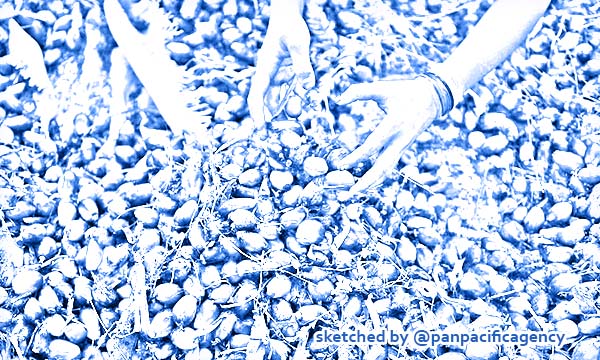India agrees to reduce export tariff on Indonesian palm oil

An Indonesian worker handles palm oil seeds at a plantation in Pelalawan, Riau province on Sumatra island. Photo: AFP/Adek Berry. Sketched by the Pan Pacific Agency.
BANGKOK, Sep 11, 2019, ANTARA. India has agreed to a 45 percent reduction in the export duty for Indonesian refined, bleached, and deodorized palm oil (RBDPO) on the similar lines as the tariff imposed for Malaysian palm oil, reported the ANTARA.
Indonesian Trade Minister Enggartiasto Lukota made the statement on late Tuesday (Sept 10), the last day of the 51st ASEAN Economic Ministers’ Meeting (AEM) held in Bangkok, Thailand.
“About the same tariff of processed palm oil or RBDPO, India said, (it will be imposed) soon,” Lukita stated.
He cited Indian Trade and Industry Minister Piyush Goyal’s response to the request that the decision on export duty for Indonesian RBDPO was made on the sidelines of the meeting.
In addition to the RBDPO export duty, Jakarta has also urged New Delhi to eliminate trade barriers for gold exports to the country, with a population of 1.3 billion.
Goyal has vowed to assess the barriers for Indonesian gold exports to India, including the prerequisite bank guarantee to export gold.
Earlier on Sunday, at a bilateral meeting with his Indian counterpart on the sidelines of the AEM, Lukita had called to reduce tariffs for RBDPO exports to India to the same level as those imposed for Malaysian products to make Indonesian products more competitive vis-á-vis Malaysian ones.
India had imposed a 45 percent tariff for Malaysian palm oil exports under the India-Malaysia Comprehensive Economic Cooperation (IMCECA), while the export duty on palm oil under the ASEAN-India Free Trade Agreement (AIFTA) was set at 50 percent.
In response to this, Indonesia has offered market access for India to export raw sugar by lowering the standard of International Commission for Uniform Methods of Sugar Analysis (ICUMSA) for imported refined crystal sugar, from 1,200 to 200.
Lukita remarked that India had responded positively to the offer.
Currently, Australia and Thailand have emerged as the key suppliers of Indonesian raw sugar imports.
India was the fourth-biggest export destination country and the ninth-largest importer for Indonesian products in 2018.
Bilateral trade during the period had reached US$18.7 billion, wherein Indonesia enjoyed a surplus of $8.7 billion.
Indonesia’s exports to the country in 2018 were recorded at $13.7 billion and imports at $5 billion.
Indonesia’s main exports to India comprise coal, with exports reaching $5.37 billion in 2018; palm oil and its derivatives, $3.56 billion; natural rubber, $429.2 million; and copper ore and concentrate, $414.9 million.